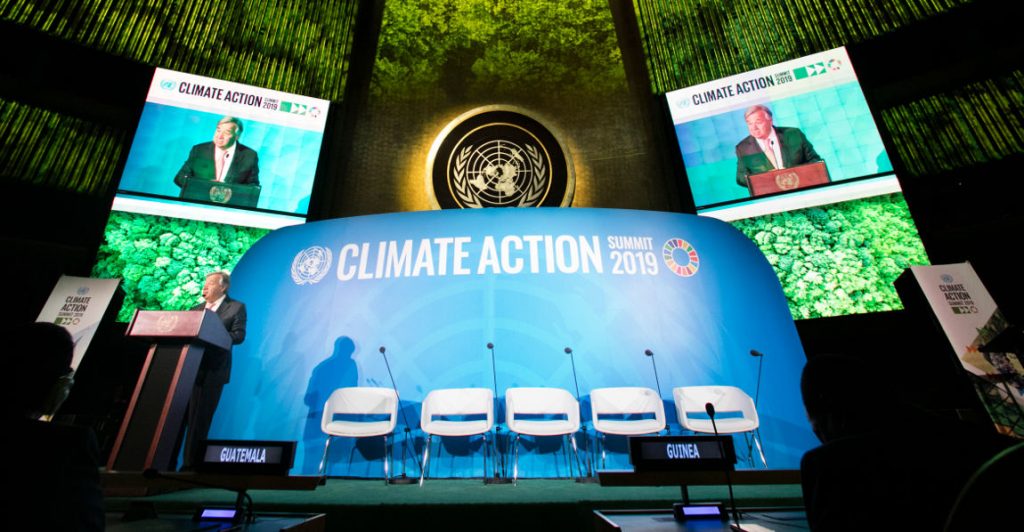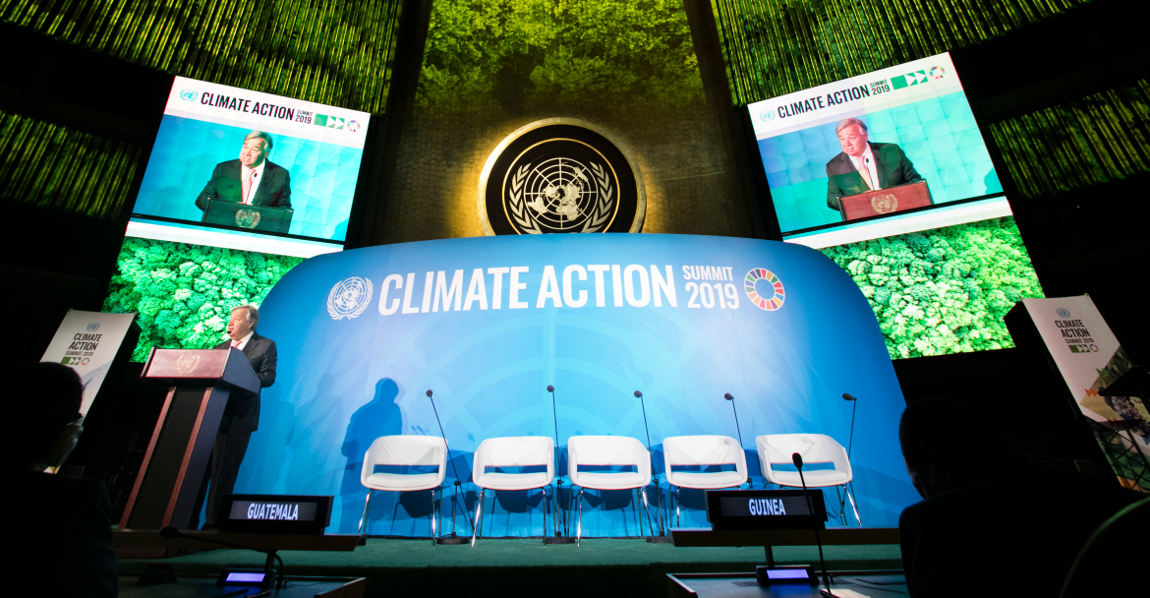NEW YORK (Via News) – When the Paris Agreement entered into force back on 4 November 2016, nations gathered around a common goal, to combat climate change. A series of targets were established to walk towards a sustainable future for all.
Limiting global temperature increase to well below 2 degrees Celsius constitutes the central aim. The international climate Agreement, ratified to date by 185 parties, also reads that all countries shall review their contributions to reducing greenhouse gas emissions every five years.
Nevertheless, a week ago, a new study by United in Science, coordinated by the World Meteorological Organization shows that a much stronger commitment is needed to reach those targets.

A clear example can be found in the Emissions Gap Report 2019, which indicates that greenhouse gas emissions continued to rise in 2018.
The report was published previous to the beginning of the Climate Action Summit convened by the UN Secretary-General António Guterres celebrated in the City of New York on 23 September.
The Summit reunited world government´s leaders, private sector, and civil society around the table to discuss solutions and accelerate action on the global climate emergency.
Over 65 world leaders attended the Climate Action Summit, among them, Germany Chancellor, Angela Merkel, French President, Emmanuel Macron, Prince of Monaco, Albert II and Emir, Sheikh Tamim bin Hamad Al-Thani from Qatar.
The United States of America left the Paris Agreement back in 2017, a decision made by the US President Donald Trump, who did not participate in the event.
An urgent call for action
In his opening speech, the United Nations Secretary-General highlighted the importance of moving from words to action and fast.
“This is not a climate talk summit. We have had enough talk.”
“This is not a climate negotiation summit. You don’t negotiate with nature. This is a climate action summit.”
Guterres also brought attention to the rise of global temperatures, emphasizing on reducing emissions, and urging to reach carbon neutrality by 2050.
“The best science, according to the Intergovernmental Panel on Climate Change, tells us that any temperature rise above 1.5 degrees will lead to major and irreversible damage to the ecosystems that support us.”
“Science tells us that on our current path, we face at least 3-degrees Celsius of global heating by the end of the century.”
“The climate emergency is a race we are losing, but it is a race we can win.”
“Governments are here to show you are serious about enhancing Nationally Determined Contributions under the Paris Agreement. Cities and businesses are here showing what leadership looks like, investing in a green future. Financial actors are here to scale-up action and deploy resources in fundamentally new and meaningful ways. Coalitions are here with partnerships and initiatives to move us closer to a resilient, carbon-neutral world by 2050,” he added.
United in science – Report highlights
“It highlights the urgent need for the development of concrete actions that halt global warming and the worst effects of climate change,” said the Science Advisory Group.
The average global temperature for 2015–2019 is on track to be the warmest of any equivalent period on record. It is currently estimated to be 1.1°Celsius (± 0.1°C) above pre-industrial (1850–1900) times.
Overall, the amount of ice lost annually from the Antarctic ice sheet increased at least six-fold between 1979 and 2017. Glacier mass loss for 2015-2019 is the highest for any five years on record.
The observed rate of global mean sea-level rise accelerated from 3.04 millimeters per year (mm/yr) during the period 1997–2006 to approximately 4mm/yr during the period 2007–2016 due to the increased rate of ocean warming and melting of the Greenland and West Antarctica ice sheets.
There has been an overall increase of 26% in ocean acidity since the beginning of the industrial era.
Levels of the main long-lived greenhouse gases, carbon dioxide (CO2), methane (CH4) and nitrous oxide (N2O) have reached new highs.
Preliminary data from a subset of greenhouse gas monitoring sites for 2019 indicate that CO2 concentrations are on track to reach or even exceed 410 parts per million (ppm) by the end of 2019.
Current economic and energy trends suggest that emissions will be at least as high in 2019 as in 2018. Global GDP is expected to grow at 3.2% in 2019, and if the global economy decarbonized at the same rate as in the last 10 years, that would still lead to an increase in global emissions.
The net-zero emissions needed to stabilize the climate requires both an acceleration in the use of non-carbon energy sources and a rapid decline in the global share of fossil fuels in the energy mix. This dual requirement illustrates the scale of the challenge.
The report concludes “Only immediate and all-inclusive action encompassing: deep de-carbonization complemented by ambitious policy measures, protection and enhancement of carbon sinks and biodiversity, and efforts to remove CO2 from the atmosphere, will enable us to meet the Paris Agreement.”
The First youth Climate Summit at the United Nations
The Climate Action Summit was preceded by the Youth Summit featuring a full-day programme in which young leaders from over 140 countries talked about their ideas and initiatives on climate change.
The host of the event and key listener UN Secretary-General António Guterres shared his thoughts with the young leaders.
“We are not yet there,” Mr. Guterres said, adding that we are “still losing the race” against climate change. “But there is a change in momentum. Largely this change in momentum was due to your [Greta Thunberg’s] initiative, and to the courage with which you have started this movement.”
“Millions around the world [are] saying clearly, not only that they want change, not only that decision-makers must change, but they want them to be accountable,” he added.
The young climate activist Greta Thunberg delivered a powerful speech that echoed all over the world.
“You all come to us young people for hope. How dare you? You have stolen my dreams and my childhood with your empty words, and yet I’m one of the lucky ones. People are suffering. People are dying. Entire ecosystems are collapsing.”
“You say you hear us and that you understand the urgency. But no matter how sad and angry I am, I do not want to believe that. Because if you really understood the situation and still kept on failing to act, then you would be evil. And that I refuse to believe.” the Swedish added.
Initiatives for a better future
Mr. Guterres closed the Summit remarking, “You have delivered a boost in momentum, cooperation, and ambition. But we have a long way to go.”
“We need more concrete plans, more ambition from more countries and more businesses. We need all financial institutions, public and private, to choose, once and for all, the green economy.”
Both, governments and the private sector announced new initiatives to accelerate the actions towards the climate crisis.
France announced that it would not enter into any trade agreement with countries that have policies counter to the Paris Agreement.
Germany committed to carbon neutrality by 2050.
Twelve countries made financial commitments to the Green Climate Fund, the official financial mechanism to assist developing countries in adaptation and mitigation practices to counter climate change.
The United Kingdom doubled its overall international climate finance to L11.6 billion for the period from 2020 to 2025.
India pledged to increase renewable energy capacity to 175gw by 2022 and committed to further increasing to 450GW and announced that 80 countries have joined the International Solar Alliance.
China said it would cut emissions by over 12 billion tons annually and would pursue a path of high-quality growth and low carbon development.
The European Union announced at least 25% of the next EU budget will be devoted to climate-related activities.
The Russian Federation announced that they will ratify the Paris Agreement, bringing the total number of countries that have joined the Agreement to 187.
Pakistan said it would plant more than 10 billion trees over the next five years.
A total of 130 banks – one-third of the global banking sector – signed up to align their businesses with the Paris agreement goals.
American businessman, Michael Bloomberg, will increase the funding and geographic spread of his coal phase-out efforts to 30 countries.
Heads of State from Finland, Germany, Greece, Hungary, Ireland, Italy, Netherlands, Portugal, and Slovakia, are among those that announced that they will work to phase out coal. The Republic of Korea announced it would shut down four coal-fired power plants, and six more will be closed by 2022, as well as the doubling of its contribution to the Green Climate Fund.
A Climate Investment Platform was officially announced. It will seek to directly mobilize US$ 1 trillion in clean energy investment by 2025 in 20 Least Developed Countries in its first year.
President of Chile, Sebastián Piñera announced the creation of the Ambition Alliance launched by Chile with the involvement of the private sector to reach the goal set by the Paris Agreement.
“Today we are announcing a historic, groundbreaking Climate Ambition Alliance. Many Leaders have shown that boosting Nationally Determined Contributions (NDC) ambition is both necessary and possible, but other nations must follow. 2020 is just around the corner and we must realize that decisions need to be made now. We are the first generation to suffer the effects of climate change and the last one that can do something about it,” stated the President of Chile, Sebastián Piñera.
Chile will serve as host and presidency of the next United Nations Climate Change Conference (COP25) in December 2019.







